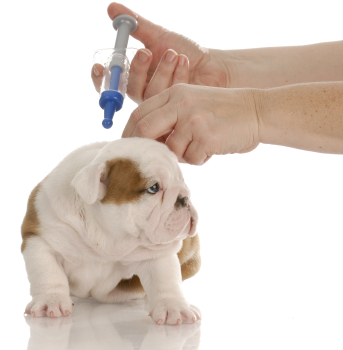 A reader recently posed a question about vaccinations and links with cancer in dogs.
A reader recently posed a question about vaccinations and links with cancer in dogs.
I discussed this in more detail in the Guide, along with many other factors that may (or may not) have links to cancer. But, since it came up, I thought it might make a good post.
If reader is looking for a vilification of vaccines, a carte-blanche condemnation of the practice of vaccination, a hysterical, reactive, anti-ist, myopic tirade against vaccines in general, you may want to stop reading. This is not the proper forum for that type of thing so common in certain circles these days.
Okay, with that out of the way, let’s look at the situation like rationale, clear thinking human beings. The situation is not clear cut, and that recognition should be established early.
For those who want the bottom line now: No vaccinations for dogs with cancer. None. Vaccinations have complex interactions with the immune system and these are not predictable and can be harmful in dogs with cancer. Use the minimum vaccinations for your pet’s lifestyle, needs, and other health issues.
But don’t eliminate all vaccinations in healthy pets. From the viewpoint of someone who deals with diseases that vaccines prevent, I can promise you that if your dog were to experience parvo or distemper, you would wish she had been protected…but only after the fact, after you had endured the pain of witnessing the horror show of these problems in your loved dog.
And of course vaccinations have side effects, like anything (yes, even homeopathy), and these must be contended with.
Like any medical intervention, we have to analyze whether the costs outweigh the benefits. With vaccination, I’ve stated the benefit already: prevention of diseases that your dog may contract if they are present. This means, of course, that if there is no Lyme disease where your dog walks, no ticks to spread the bacteria, don’t vaccinate against Lyme disease. I give very little kennel cough vaccine to adult dogs because there is very little kennel cough where I practice. I don’t vaccinate my patients against rabies as we have a rabies-free state. I don’t vaccinate against leptospirosis in any puppy, Dachschund, Poodle, or dogs that are not always going in fresh water, where it is carried.
Yet, we have parvo outbreaks. And friends, parvo can kill a dog just like cancer. I quote clients about a 70-80% survival rate with 24-hour intensive care but we treat the disease very aggressively and use many different tools to do so. I suspect overall survival rates for parvo are lower than that. And friends, if your dog’s intestine is bleeding out and he is lying on the ground with low blood sugar, destroyed electrolytes, and vomiting but can barely lift his head to do so..suddenly…preventing parvo doesn’t seem like such a bad idea after all.
But what about the negatives of vaccination? Well, these are not quite as well documented in the conventional literature. This means that you cannot find all that much on direct links between vaccines and diseases or problems resulting from them in the dog. However, there are some pretty compelling bits of information from human medicine that we can apply to dogs. This is especially true as dogs are models for human cancers, and we vets use many of the same tests, drugs, and other treatments that are provide to humans.
Alternative vets describe something called vaccinosis, which means the vaccine negatives, more or less. An “-osis”, similar to a disease. These effects could include, for example, allergic reactions. (Then again apples make my lips swell and I still think apples are okay for other people…but I digress..) So a vaccination can cause an allergic reaction, but they are pretty rare, and can most often be managed in a strait-forward way.
Vaccines are now being more or less accepted as increasing the risk for immune system problems, especially involving the blood. These problems include cases where the immune system starts to attack blood cells, like red or white blood cells, or platelets. For this reason, in dogs that already have a predisposition towards those diseases (Poodles for example, or dogs with clinical inflammatory disorders of any kind), I don’t vaccinate or do so much less, or with precautionary steps.
In cats, there is actually a tumor specifically caused by vaccinations, called a vaccine-induced sarcoma, or “vaccosarcoma”. This is not found though in dogs.
Now comes the murkier stuff that is not very well documented, but is suspicious and raises flags in my mind. First, the immune system has traditionally been thought of as if it had unlimited ability to to respond to things. In reality it does not. Vaccination of newborn babies creates what is called a polarity shift in the immune response. This means the immune system shifts to defend itself against the diseases in the vaccine, as a response to the vaccination. Here is a publication in humans, and here is one in mice, and here’s a related one in mice as well.
This polarity shift pulls the immune system away from cancer surveillance later in life (shown in rodents anyway), and appears to be a permanent change. In other words, the immune system is primed to fight infectious disease, but at the expense of protecting or screening the body from developing cancer cells.
Now, this has not been shown in dogs, but it has been in other species. And I strongly suspect that the same effects occur in dogs. And who knows what other items we don’t know about. Who knows about the heavy metals or preservatives and whatnot in vaccines, whether in dogs there really is a connection to other forms of immune mediated disease (I suspect so), or certain neurologic or other problems.
In my practice therefore, I start the vaccine series a little later than normal to try to minimize this possible polarity shift. I cannot prove it works, but because there is compelling evidence of this phenomenon, I do what I can to include these ideas in daily medicine. We also only vaccinate with core vaccines at 1 and 4 years, then only possibly later if needed. We test for protection using what is called a titer test, which is a crude way of assessing protection in a dog at a point in time….to see if a vaccination is needed, before just administering it. We try to minimize other vaccines as much as possible. When the dog does not get the vaccine, they get a titer test to make sure they have left over protection from previous vaccinations.
Some guardians like to give Thuja occidentalis, a homeopathic that seems to help a little with “vaccinosis”. I kind of like Thuja. Data? Nope.
So, those are some of my thoughts concerning vaccinations in dogs. I hope this helped clarify this rather complicated issue.
For more information about topics like this and their connection to cancer, read the Guide.
Best
Dr D
http://www.dogcancerblog.com/vaccination-and-dog-cancer/?utm_source=feedburner&utm_medium=feed&utm_campaign=Feed%3A+DogCancerBlog+%28Dog+Cancer+Blog%29

 A reader recently posed a question about vaccinations and links with cancer in dogs.
A reader recently posed a question about vaccinations and links with cancer in dogs.

